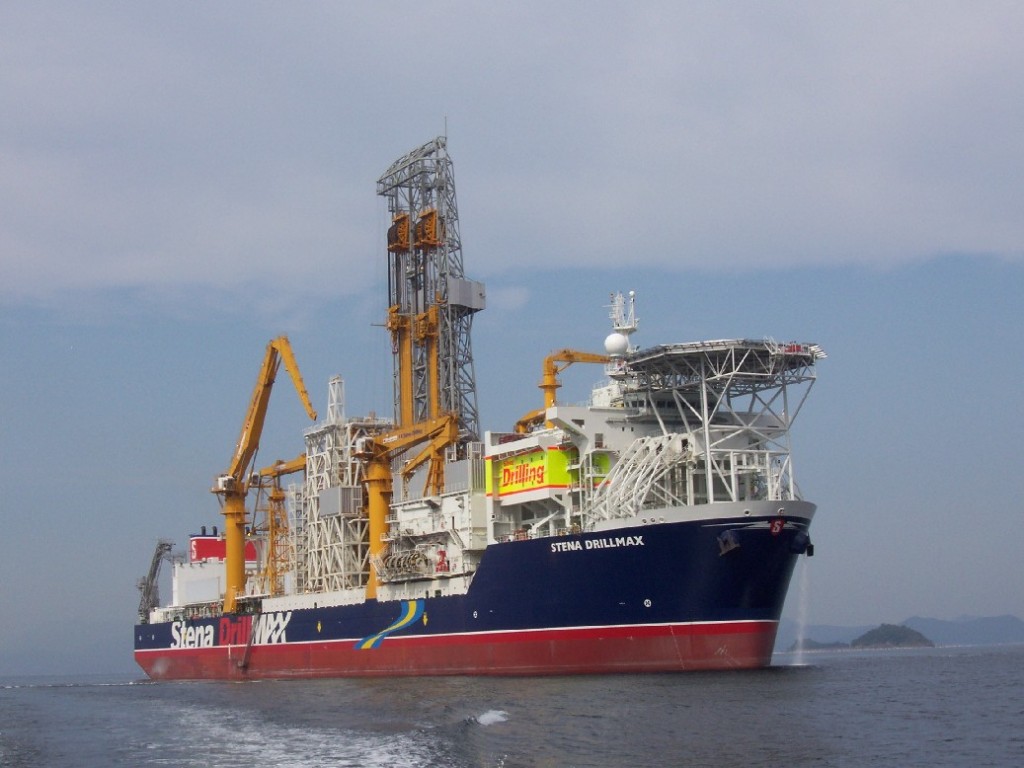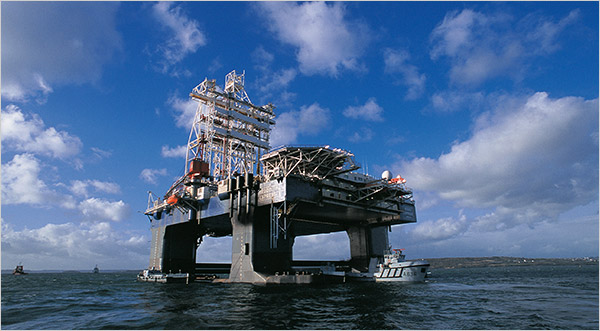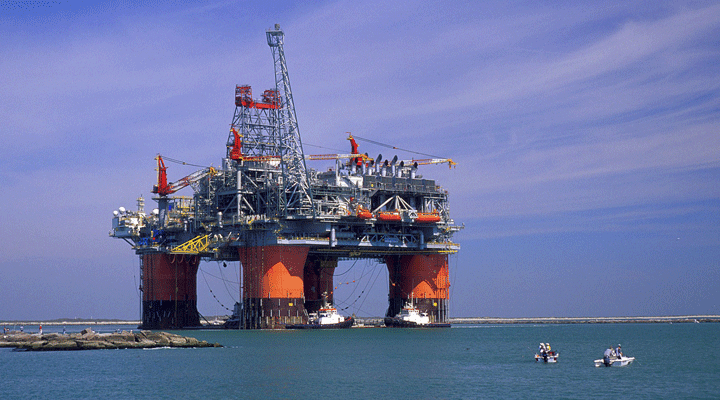French Guiana’s offshore oil: profit trumps environmental protection?
An offshore oilfield discovery in September 2011 within the French Guiana Zaedyus exploratory well by Tullow Oil plc, a British oil and gas exploration company, finally pinpointed the country’s anticipated large reservoir. The new oilfield holds anywhere from 500 to 850 million barrels according to Tullow. It can be found in the Guiana’s extractive area which is considered far bigger than Campos basin, a giant source of crude oil and natural gas off Rio de Janeiro.(1) It has a depth similar to Brazil’s pre-salt oilfields where drilling exploration ranges from 6,758 feet at the ocean’s floor to about 19,500 feet. Aside from geophysical difficulty, the future of the zone mostly must now rely on the turbulent political habits in France’s oil exploitation modalities.

Tullow has been exploring the area since 2001, following an official maritime license it shares with the two “supermajors” Shell and Total, along with the Northpet Petroleum plc joint venture, which respectively own 45, 25 and 2.5 percent of the Zaedyus well.(2) Royal Dutch Shell, head of prospection and negotiation with the public authorities, clearly holds the largest claim to it.
In June 2012, Royal Dutch Shell plc decided to begin exploration. Yet its work was halted even before it began, as the Shell-chartered drillship sailed from South Korea to French Guiana. The French minister of ecology Nicole Bricq and the French industry minister Arnaud Montebourg decided to suddenly suspend authorization on June 13. This turnaround demonstrates the complexity underlying a petroleum operation within the global framework of conflicting interests, increased drilling difficulties and pressures to transform into a national hydrocarbon producer.
Specifically, the suspension reflects close cooperation between the ministers of the new left-wing French government involved in the decision. In a joint announcement, the ministers voiced agreement on three distinct priorities. One of the priorities was the reinforcement of environmental protections, undermined by a drilling process involving a particularly high-risk exploitation. Because of the depths of the deposits, extraction would use the high-polluting oil-based mud technique. The other two priorities motivating the suspension were to cut back on disastrous French energy expenditures that totaled approximately $75.4 billion in 2011 and to increase the low revenues per inhabitant in Guiana which barely reached $17,107 in 2008.
Most strikingly, the announcement by the government appeared politically accommodating in its defense of environmental protection over uncertain economic gains from drilling. It came at a convenient moment for the French ruling party, however, just prior to the Rio+20 Summit on Sustainable Development and legislative elections in the country, which resulted in a landslide victory for the Socialist Party. The decision may then be seen more as a maneuver by the government to fortify its energy sovereignty than as the so-called ecological transition promised by the country’s leaders.(3) If that is the case, the new governmental policy has resulted more in a political adjustment than in the “change” explicitly promoted during the presidential campaign.
Such interpretations are supported by pundits’ speculations that the sudden dismissal of Ms. Bricq from her ministry on June 21 and appointment as Minister of Foreign Trade, a lower formal rank, was prompted by her over-emphasis on environment while releasing the government’s decision to the public. This conclusion has been further bolstered by official plans to reinforce physical protection around the Zaedyus well instead of blocking extraction. While Bricq claimed the suspension resulted from a need to reform the national mining code, Minister for Overseas Victorin Lurel has since clarified that the reappointment actually involved the renegotiation of dividends. What is more, the very rapid resumption of the authorization process by the end of June implies only a modest alteration of the mining code regulating the Zaedyus well. The decision thereby marks a monumental victory for the powerful oil lobby which actively exerts power on local and national political authorities after legislative elections that finally convinced Prime Minister Jean-Marc Ayrault to take back the issue.(4) Focusing on job and industry, he conceded France’s commitments to the protection of the environment and stable development of exploratory and extractive activity, arguing that the previous government had already given France’s word to the companies. If nothing else, this decision-making progress highlights a worrisome lack of governmental transparency.

Adding to these concerns, the Guyanese people have interestingly produced a massive lobbying effort in favor of the development of the offshore reservoir by Tullow.(5) Lead by a panel of local officials, the locals have expressed a preference for drilling despite the risks due to the substantial royalties involved. According to French Minister of Justice Christiane Taubira, a native from French Guiana, just half of the expected royalties would confer the oversea region with greater autonomy and power. French Guiana’s unemployment rate illustrates this truth, as it shows a stabilization figure at a whopping 21.0 percent.(6) Shell France CEO Patrick Roméo rightly observed that drilling would also produce jobs in France and reduce the money the country spends on its oil importations, possibly even stimulating an economic recovery.(7)
Nevertheless, a plethora of NGOs and a minority of the 232,000 total Guyanese population firmly opposes the decision for technical and ideological reasons. They denounce what they call a juridical vacuum and argue that revision of the mining code only looked at the royalties distribution. As Christian Roudgé, coordinator of the NGO French Guiana Nature Environment, explains, “profit will be private and risks will be public” over a remote, fragile and uniquely rich ecosystem. That is why NGOs lambast the haste of official authorization for which a social debate and a referendum appear to have been crucial. After the beginning of the drilling process, a judicial process was collectively launched on July 11 by NGOs and citizens involved in the affair to hold the French Guiana Administrative Court and the Minister of Ecology responsible for “[abuses] of power.”(8) Freshly appointed Minister Delphine Batho asserted that the government would respect the precautionary principle and transparency for the sake of its citizens.
Although French ecological concerns are real, as demonstrated by the June 2011 interdiction of hydraulic fracturing of shale gas, it appears that the Ministry of Ecology stands more as a regulator of the status quo than a real precedent-setting authority. By endorsing oil extraction, French Guyanese and France have blinded themselves to the benefits of environmental protections under the allure of enhanced national energy geopolitics that this rich continental shelf would bring. An oil spill would be devastating for the people of French Guiana and for the nation’s resource independence. Peaceful democratic negotiations between the overseas territory and the metropolis on the royalties question, however, provide reasonable hope for Guyanese social improvement. They might even counteract separatist sentiments, historically very low, in spite of French Guiana’s huge new potential financial manna.
Please accept this article as a free contribution from COHA, but if re-posting, please afford authorial and institutional attribution.
Exclusive rights can be negotiated.
[1] Estimation made by CGX Energy inc and conferring to its own license. “Positioned for Guyana Atlantic Basin Success”, CGX Energy Inc., 04.2012, http://cgxenergy.ca/cmsAssets/docs/presentations/CGX%20Presentation%20-%20April%202012.pdf
[2] “Zaedyus exploration well makes oil discovery offshore French Guiana”, Tullow Oil Plc, 09.09.11,http://www.tullowoil.com/index.asp?pageid=137&newsid=710
[3] Mercier, Anne-Sophie. « Les dessous de l’éviction de Nicole Bricq du ministère de l’écologie », Paris : Lemonde.fr, 06.26.12,http://www.lemonde.fr/politique/article/2012/06/26/les-dessous-de-l-eviction-de-nicole-bricq-du-ministere-de-l-ecologie_1724497_823448.html
[4] Albert, Caroline. « Forages pétroliers en Guyane: Shell dit vouloir protéger l’environnement », 7sur7.be, 06.26.12, http://www.7sur7.be/7s7/fr/2765/Environnement/article/detail/1460209/2012/06/26/Forages-petroliers-en-Guyane-Shell-dit-vouloir-proteger-l-environnement.dhtml
[5] Lopez, Marie-Caroline. « Pétrole en Guyane : pourquoi le gouvernement est contraint de reculer », Paris : Latribune.fr (source Reuters), 06.21.12, http://www.latribune.fr/entreprises-finance/industrie/energie-environnement/20120620trib000704891/petrole-en-guyane-pourquoi-le-gouvernement-est-contraint-de-reculer.html
[6] 2nd trimester, 2010, INSEE.
[7] Source : Lemonde.fr
[8] AFP, Reuters.


